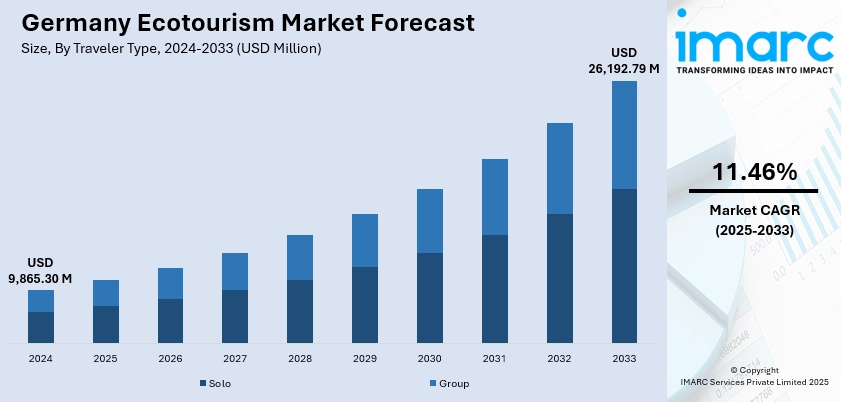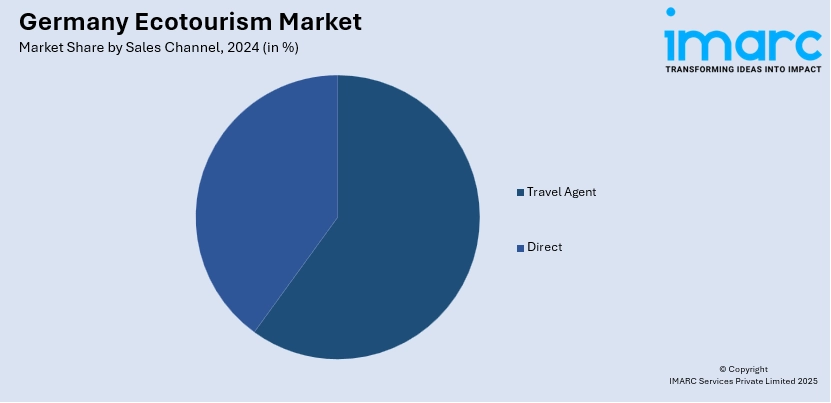
Germany Ecotourism Market Size, Share, Trends and Forecast by Traveler Type, Age Group, Sales Channel, and Region, 2025-2033
Germany Ecotourism Market Overview:
The Germany ecotourism market size reached USD 9,865.30 Million in 2024. The market is projected to reach USD 26,192.79 Million by 2033, exhibiting a growth rate (CAGR) of 11.46% during 2025-2033. The market is propelled by the country's strong environmental awareness and supportive government policies promoting sustainable travel. In addition to this, growth in eco-certified accommodations and responsible tour operations strengthens the sector's position among domestic and international travelers seeking low-impact alternatives. Moreover, rising demand for authentic local experiences and nature-based activities boosts spending in protected areas and rural regions, which is further augmenting the Germany ecotourism market share.
|
Report Attribute
|
Key Statistics
|
|---|---|
|
Base Year
|
2024 |
|
Forecast Years
|
2025-2033
|
|
Historical Years
|
2019-2024
|
| Market Size in 2024 | USD 9,865.30 Million |
| Market Forecast in 2033 | USD 26,192.79 Million |
| Market Growth Rate 2025-2033 | 11.46% |
Germany Ecotourism Market Trends:
Rise in Sustainable Travel Preferences
In recent years, there has been a noticeable shift toward sustainability in travel preferences among German consumers, influencing the ecotourism market. Additionally, tourists are becoming more conscious of their ecological footprint and hence opt for experiences that emphasizes ecological conservation and the well-being of the community. Though Germany is generally considered to be among the most environmentally advanced nations in Europe, industry reports indicate that fewer than 2,000 of its 12,000 hotels, or about 15%, now present certified climate pledges to visitors. This relatively modest adoption rate highlights a gap between consumer expectations and industry readiness. However, as demand for sustainable lodging continues to rise, many hospitality providers in Germany are beginning to adapt by investing in eco-certifications, energy-efficient infrastructure, and nature-friendly operations to align more closely with evolving traveler values. Furthermore, the rise of digital platforms that promote sustainable travel, offering information on carbon-neutral activities, has further bolstered this trend. Additionally, younger generations, especially Millennials and Gen Z, who prioritize environmental and social values, are driving this demand. As consumers opt for more ethical travel experiences, ecotourism providers in Germany are investing in practices that support biodiversity conservation, energy efficiency, and waste reduction, contributing to the overall growth of the market. These shifts in consumer behavior suggest that sustainability is no longer a niche interest but a mainstream consideration for travelers in Germany.

To get more information on this market, Request Sample
Government Support for Green Tourism Initiatives
Government policies play a significant role in propelling the Germany ecotourism market growth. Through strategic initiatives, such as subsidies for sustainable tourism infrastructure and promoting eco-friendly destinations, Germany's government supports the development of a greener tourism sector. Notably, on March 4, 2023, the German National Tourist Board (GNTB) relaunched its “Embrace German Nature” campaign to align with rising demand for sustainable travel and to support Germany’s Sustainable Development Goals. The initiative highlights the nation’s blend of protected landscapes, eco-conscious infrastructure, and cosmopolitan appeal, aiming to position Germany as a premier destination for environmentally responsible holidays. The nation's dedication to carbon emissions reduction and environmental protection complements the emergence of ecotourism as a plausible travel option. The Federal Ministry for the Environment has instituted several programs that persuade destinations to employ sustainable practices, such as "Green Travel" certification standards for enterprises. These certifications provide tourists with confidence that their lodging, transportation, and activities selection are environmentally safe. In addition, local authorities are linking ecotourism to more general regional development strategies, making nature-based tourism one of the major economic sectors. Such government-sponsored assistance not only fosters environmentally sound development of tourism but also assists German ecotourism suppliers to compete in the wider European market.
Germany Ecotourism Market Segmentation:
IMARC Group provides an analysis of the key trends in each segment of the market, along with forecasts at the country and regional levels for 2025-2033. Our report has categorized the market based on traveler type, age group, and sales channel.
Traveler Type Insights:
- Solo
- Group
The report has provided a detailed breakup and analysis of the market based on the traveler type. This includes solo and group.
Age Group Insights:
- Generation X
- Generation Y
- Generation Z
A detailed breakup and analysis of the market based on the age group have also been provided in the report. This includes generation X, generation Y, and generation Z.
Sales Channel Insights:

- Travel Agent
- Direct
The report has provided a detailed breakup and analysis of the market based on the sales channel. This includes travel agent and direct.
Regional Insights:
- Western Germany
- Southern Germany
- Eastern Germany
- Northern Germany
The report has also provided a comprehensive analysis of all the major regional markets, which include Western Germany, Southern Germany, Eastern Germany, and Northern Germany.
Competitive Landscape:
The market research report has also provided a comprehensive analysis of the competitive landscape. Competitive analysis such as market structure, key player positioning, top winning strategies, competitive dashboard, and company evaluation quadrant has been covered in the report. Also, detailed profiles of all major companies have been provided.
Germany Ecotourism Market News:
- On April 22, 2025, Germany’s National Tourist Office announced a EUR 2 Million (about USD 2.3 Million) investment in a targeted campaign to attract Indian travelers, emphasizing sustainable travel, cultural immersion, and year-round destination appeal. The initiative features the “Feel Good” eco-tourism campaign and highlights culinary tourism, nature trails, and heritage sites, with a strategic focus on Tier 1 and Tier 2 Indian cities. With digital marketing, influencer partnerships, and enhanced air connectivity, the effort aims to strengthen Germany’s visibility in India and deepen tourism ties by 2025.
Germany Ecotourism Market Report Coverage:
| Report Features | Details |
|---|---|
| Base Year of the Analysis | 2024 |
| Historical Period | 2019-2024 |
| Forecast Period | 2025-2033 |
| Units | Million USD |
| Scope of the Report |
Exploration of Historical Trends and Market Outlook, Industry Catalysts and Challenges, Segment-Wise Historical and Future Market Assessment:
|
| Traveler Types Covered | Solo, Group |
| Age Groups Covered | Generation X, Generation Y, Generation Z |
| Sales Channels Covered | Travel Agent, Direct |
| Regions Covered | Western Germany, Southern Germany, Eastern Germany, Northern Germany |
| Customization Scope | 10% Free Customization |
| Post-Sale Analyst Support | 10-12 Weeks |
| Delivery Format | PDF and Excel through Email (We can also provide the editable version of the report in PPT/Word format on special request) |
Key Questions Answered in This Report:
- How has the Germany ecotourism market performed so far and how will it perform in the coming years?
- What is the breakup of the Germany ecotourism market on the basis of traveler type?
- What is the breakup of the Germany ecotourism market on the basis of age group?
- What is the breakup of the Germany ecotourism market on the basis of sales channel?
- What is the breakup of the Germany ecotourism market on the basis of region?
- What are the various stages in the value chain of the Germany ecotourism market?
- What are the key driving factors and challenges in the Germany ecotourism market?
- What is the structure of the Germany ecotourism market and who are the key players?
- What is the degree of competition in the Germany ecotourism market?
Key Benefits for Stakeholders:
- IMARC’s industry report offers a comprehensive quantitative analysis of various market segments, historical and current market trends, market forecasts, and dynamics of the Germany ecotourism market from 2019-2033.
- The research report provides the latest information on the market drivers, challenges, and opportunities in the Germany ecotourism market.
- Porter's five forces analysis assist stakeholders in assessing the impact of new entrants, competitive rivalry, supplier power, buyer power, and the threat of substitution. It helps stakeholders to analyze the level of competition within the Germany ecotourism industry and its attractiveness.
- Competitive landscape allows stakeholders to understand their competitive environment and provides an insight into the current positions of key players in the market.
Need more help?
- Speak to our experienced analysts for insights on the current market scenarios.
- Include additional segments and countries to customize the report as per your requirement.
- Gain an unparalleled competitive advantage in your domain by understanding how to utilize the report and positively impacting your operations and revenue.
- For further assistance, please connect with our analysts.
 Request Customization
Request Customization
 Speak to an Analyst
Speak to an Analyst
 Request Brochure
Request Brochure
 Inquire Before Buying
Inquire Before Buying




.webp)




.webp)












